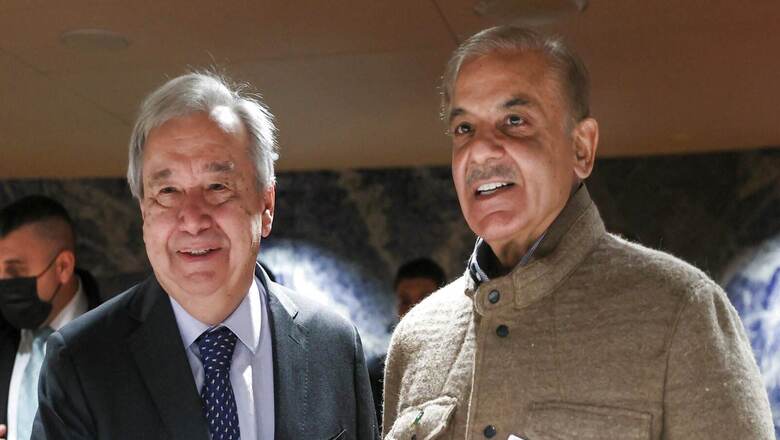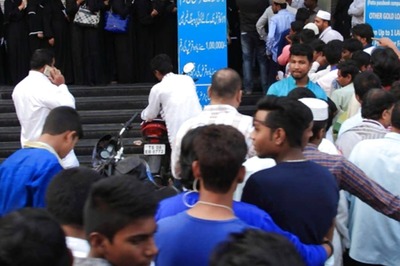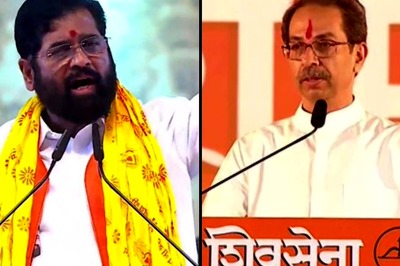
views
When UN Secretary-General António Guterres raised his pitch for financial aid to Pakistan in September 2022, he said, “We have waged a war with nature, and nature is tracking back and striking back at us.” The nature we know of, unless we choose to be atheists, is divinity. And since I am among the majority who believe in divinity, I can perceive what seemingly Guterres has failed to perceive, or is perhaps ignoring.
Divinity (or nature as you may call it) in its various languages/cultures/religious scriptures, impeccably advocates humanity and compassion. As a Muslim, for me, these words are derived from the Holy Quran. My Allah, who has delivered his will to humans through the Holy Quran — the purest source of Islam — has mentioned that it is indeed righteousness and compassion that he loves the most in humans, and especially commands his worshippers to inculcate these virtues.
But if his believers stray from these qualities, surely Allah delivers justice (Quran verse 4:135), notwithstanding the religious background of the wrongdoer. Until of course, the wrongdoer repents and seeks forgiveness. The absolute same belief exists in the scriptures of Christianity.
But it is surprising how Guterres — a practising Catholic — overlooked the role of divinity in the miserable condition of Pakistan, today. He rightly pointed out that Pakistan has not contributed to climate change because its emission levels are low, yet it has been dramatically impacted by climate change. But, in a divine moment, did he stop to think why this happened to Pakistan despite its low contribution to climate change?
At the cost of sounding deliriously communal, someone’s got to say this- The values of humans — respect, compassion, gratitude and loving all as you would love yourself — are unfortunately not imbibed in Pakistani people and their way of life. Despite claiming to be Muslims, they suffer from all the syndromes that the Holy Quran warns us against.
- The supremacist syndrome (Al Isra:37)
- The anti-semitic syndrome (Al Maidah:21)
- The intolerance towards polytheists (60:9, 5:48, 109:6 etc)
- The intolerance towards the West (Christians) (Al Maidah 82)
- The friendship with rogues (China, which successfully plagued the world with Covid and continues human rights violations within the Uyghur community) (28:15)
Five of the seven deadly sins in the Christian Scripture The Book of Proverbs are culturally accepted norms of the Pakistanis.
Let’s study them one by one.
Pride: Former Pakistani Prime minister Benazir Bhutto’s infamous speech that roused resistance in Kashmir and became responsible for the deaths of 48000 people, including civilians and security personnel, reeked of supremacy when she said, “Kashmiris like us Pakistanis are proud mujahids.” But she wasn’t the first. Before her, Pakistan’s second Prime Minister Khwaja Nizamuddin indulged in horrific and inhuman mass atrocities stemming from an ingrained sense of supremacy- like crushing the Bengali language movement with a cold-blooded massacre of the Bengalis just because they refused to accept Urdu as their official language, and sanctioning the violent religious movement against Ahmadiyya Muslim community, just because they refused to follow the Sunni Islamic way of life, taken as Pakistan’s national prestige. Even during the day, he served as Governor General, before assuming the office of the prime minister, he had quoted, “I do not agree that religion is a private affair of the individual nor do I agree that in an Islamic state, every citizen has identical rights, no matter what his caste, creed or faith be.” This quote successfully moulded the mass mindset of the then-newly established nation of Pakistan and also the conduct, decisions and destiny of its future generations. If it’s not mass feelings of supremacy in Pakistan, then how else can the world explain 106 people charged for lynching a Christian couple and their unborn child in May 2015 in Punjab province of Pakistan, or a mob of 100 accused and charged in February 2022 in Khanewal district for lynching a specially-abled man, or the mob of 87 people involved in Sialkot lynching of a Sri Lankan National? Or the forceful marriages of underage Hindu girls to Muslim men for the sole purpose of converting them to Islam, and courts refusing to hand the girls back to their parents? There are numerous accounts of inhumanities unleashed by the people of Pakistan, especially on minority communities, all based on the fundamentals of supremacy — a form of the abhorred Biblical sin— PRIDE.
Greed: Pakistan has stirred up the controversy that it is, in fact, not a democracy but a military state- with its Army influencing all its governance policies and owning most of its commercial enterprises. The latest outgoing Army Chief Qamar Javed Bajwa has proved this rumour right, as he retired a billionaire in a six-year service term. In no other country of the world does an Army official at any position retire with accumulated assets and businesses worth more than PKR 12.7 billion, ownership of an immense real estate portfolio of commercial plazas and huge farmhouses. And if you think this exhibits greediness, then there’s more! All this came to light because the Bajwa family did not pay taxes, all through his service years. As if hoarding properties and wealth in a chronically inflated economy wasn’t enough greediness on display already, they even evaded taxes. The foreign minister Bilawal Bhutto left everyone appalled when he wore shoes worth Rs 800,000 as he pitched in the United Nations for flood devastation aid for his people, who were already reeling under wheat and medicine shortages before the floods caused more disaster.
Indeed, we cannot judge a whole community by the actions of one person. But we can certainly tell from whom the community chooses and glorifies as its leaders. There are open and comprehensive revelations about the majority of Pakistan’s leaders indulging in the misappropriation of funds, including former Prime Minister Imran Khan and General Parvez Musharraf, all hero-worshipped by this community- despite their open display of corruption and greed. Imran Khan tried to use this in his election manifesto- indicating that he wants to bring ‘clean governance’ into the country. But his attempts, in case he did any, failed when his advisor for accountability Shehzad Akbar had to resign, due to his “poor performance to bring the corrupt elements under the law.”
With its corruption ranking one of the highest in the world, Pakistan’s general population, too, is widely engaged in corrupt activities- either syndicated crimes like drug trafficking, contract assassination, land grabbing, arms smuggling, or small-scale social level ones like burglaries and armed robberies. In fact, Pakistan’s mafia operations are spread all over the world, especially in the United Kingdom, the Middle East and some Scandinavian countries.
On the social level, an alarmingly large number of Pakistanis engage in armed robberies. The robbery of Rs. 9.5 million in November 2021, from a house in a top police official’s neighbourhood in Pakistan’s capital city, surprised everybody. In that month only, 59 more robbery incidents were reported in Islamabad during which the robbers looted cash and valuables worth Rs 105,948,000 including Rs 30 million from a cash van. These are undeniable indications of a society, rife with greed.
Lust: “I want to see PM Imran Khan in my bedroom” was the response of a young Pakistani girl when asked how she perceives her prime minister. And then an Opposition leader Maulana Fazal-ur-Rehman, who also happens to be a religious cleric, used this statement in his speech while addressing thousands of Pakistanis who idolise him. What does this say about the community?
Of course, it isn’t Khan’s fault entirely, that he sparks up such feelings in the female citizens of his country. With his recently leaked sex audio tapes and revelations about him from the chronicles of his ex-wife Reham Khan, it becomes clear how he likes himself to be perceived. “What somebody does in their bedroom should be none of my business or your business or anyone’s business. But when those antics are connected to merit, when they are connected to someone’s ability to govern — or lack of ability in this case — then, of course, it is public interest. It is not about an extra-marital affair,” said Reham in a TV interview in June 2018.
And surely the citizens follow their leaders. A few days ago, an Indian woman accused the staff members of Pakistan’s High Commission in New Delhi of sexual harassment, in lieu of granting her a visa. She narrated how the officer-in-charge stirred up a very casual conversation about her sex life and that made her very uncomfortable.
The leaks of Imran Khan’s phone sex chats were followed by his wife Bushra Maneka’s phone recordings. While the first was utterly pornographic, the latter was controversial because these revealed Maneka’s corrupt practices as the prime minister’s wife. It is anything but surprising, that when one types #Rawalpindi on Twitter, free-floating adverts of sex workers pop up in plenty.
Revenge porn videos released by aides of Pakistan’s political leaders emerge every now and then on social media, not just displaying the moral debasement of its people, but also their mutual indulgence in character assassination by using the power corridors of LUST.
Envy: Pakistan has been suffering from the “neighbours got it all” syndrome when it comes to India, right from the start. As of today, whether it is India’s growing GDP, space science attempts, hosting of the G20 summit or leading the SAARC nations, its position at the Security Council, growing relations with the OIC (Organisation of Islamic Cooperation) nations, its stand against terrorism or its position on Kashmir, Pakistan seems to have an objection about everything. The envy may probably be stemming from an insecurity that if India is accepted as a better country, then the whole idea of Pakistan’s creation, as a separate nation after splitting from India, would cease to make sense to people. Pakistani people, especially the celebrities and influencers, simply have to keep the pot of envy boiling and the narrative that India has a monstrous, authoritarian, communal, anti-Muslim leadership propelling so that they can pacify themselves that they are still a better nation just because they are a ‘Muslim nation’ with leaders who are not unjust to ‘Muslims’. Indicators are Imran Khan’s, Bilawal Bhutto’s or Shireen Mazari’s statements against the existing Modi government which won in a thumping majority for two whole terms. Aah! The things that ENVY makes people do.
Ingratitude: This may not be categorised as a cardinal sin, but surely it goes down the path of divine unacceptance. It helps the world to be a better place, if people not just help each other but are also aware of the help they may be unknowingly getting and are taught to be grateful for it. For example, if every layman Pakistani was made aware by its leaders that France had donated an average of USD 14.630 million between 1969 to 2016 to Pakistan, especially with respect to relief goods and health sector development, then there was a possibility that farmer Arshad Mehmood wouldn’t have cheered for his son Ali Hassan, the Pakistani man who stabbed two innocent people outside French satirical magazine Charlie Hebdo’s office in France in September 2020. Or there was a chance the Irish professor of Leonardo da Vinci University was not murdered by a Pakistani man in December 2018. In November 2020, Pakistani minister Shireen Mazari tweeted: “French President Emmanuel Macron is treating Muslims like how the Nazis treated the Jews in world war 2.” For sure, which other country first demeans a helping nation like France by provoking the world against it, then demands, and even successfully secures a pandemic relief of $183 million from it in November 2020? Just Pakistan indeed!
Despite so many sinful qualities indented in the mindset of Pakistan’s majority, some may and may not believe that the natural disasters in Pakistan are an indication of divine wrath, or not? But the bigger question here is apparent. Without first warning the Pakistani leaders to set a good example for its people, to counter the narrative of hate and encourage an ecosystem of gratitude — wherein they are made aware of how nationalities they perceive as enemies are actually helping them in distress situations — and thus containing hate crimes around the world, but instead making the world feel ‘morally corrupted’ for not opting to help Pakistan, is the UN Secretary-General playing the devil’s advocate? Or not?
Yana Mir is a journalist and social activist. She is the Vice-President of All JK Youth Society. She tweets at @MirYanaSY. The views expressed in this article are those of the author and do not represent the stand of this publication.
Read all the Latest Opinions here




















Comments
0 comment